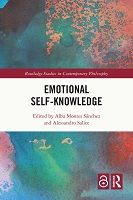Chapter 10 Hostile Affective States and Their Self-Deceptive Styles
Proposal review
Envy and Hate
Abstract
This chapter explores how individuals experiencing hostile affective states (HASs) such as envy, jealousy, hate, contempt, and Ressentiment tend to deceive themselves about their own mental states. More precisely, it examines how the feeling of being diminished in worth experienced by the subject of these HASs motivates a series of self-deceptive maneuvers that generate a fictitious upliftment of the subject's sense of self. After introducing the topic (Section 10.1), the chapter explores the main arguments that explain why several HASs involve a feeling of diminution in the subject's own value (Section 10.2). Next, it offers an analysis of how the negative feeling of self-worth motivates self-deception. While in extrinsically motivated self-deception, the subject feels diminished in worth after negatively evaluating her own HASs, in intrinsically motivated self-deception (IMSD), the negative feelings of self-worth are constituent elements of the hostile affective state in question (Section 10.3). Cases of IMSD are particularly intriguing because in them the motivation for self-deception is inherent to the hostile affective state, independently of external reasons. I coin the expression “self-deceptive style” to capture the distinctive form in which each hostile affective state intrinsically motivates changes in the architecture of the mind (e.g., perception, imagining, memory, judgment) in order to generate an upliftment of the self (Section 10.4). To show the descriptive and explanatory function of this concept, a comparative analysis of the self-deceptive styles of envy and hate is provided (Section 10.5). The conclusion summarizes the main findings and explores directions for further research (Section 10.6).
Keywords
Alba Montes Sánchez, Alessandro Salice, emotional self-knowledge, self-knowledge, emotions, affectivity, philosophy of emotion, self-discovery, social identity, responsibility, Indian philosophy, self-esteem, narrative self-understanding, Alba Montes Sánchez, Alessandro Salice, emotional self-knowledge, self-knowledge, emotions, affectivity, philosophy of emotion, self-discovery, social identity, responsibility, Indian philosophy, self-esteem, narrative self-understanding, boredom, introspection, self-consciousness, group-based emotions, hostile emotionsDOI
10.4324/9781003310945-13ISBN
9781032317106, 9781032317113, 9781003310945Publisher
Taylor & FrancisPublisher website
https://taylorandfrancis.com/Publication date and place
2023Grantor
Imprint
RoutledgeClassification
Philosophy of mind


 Download
Download